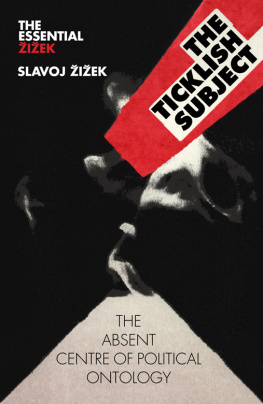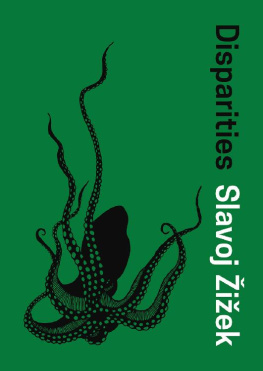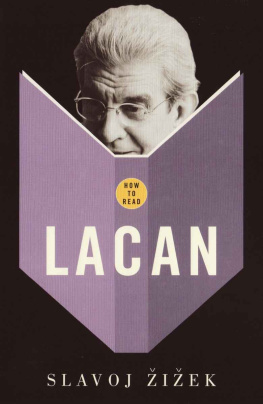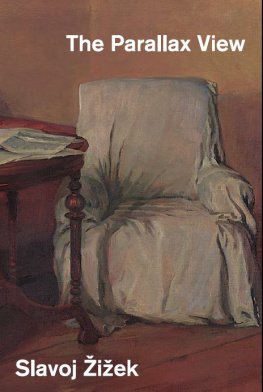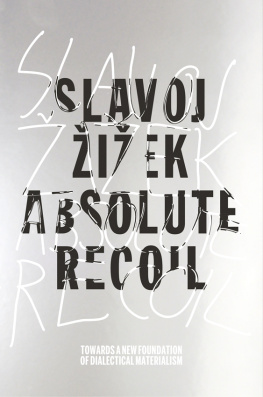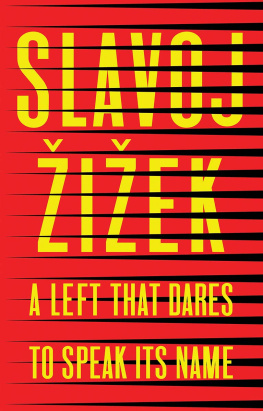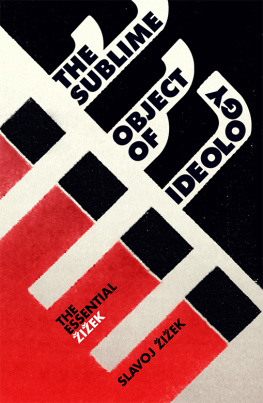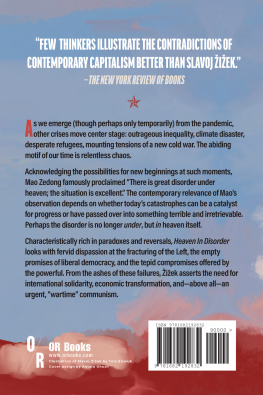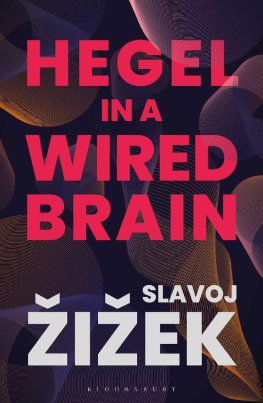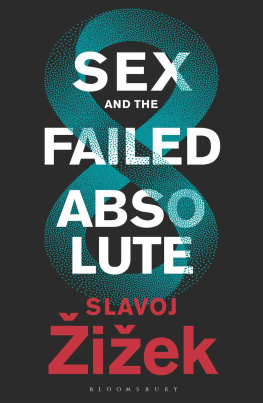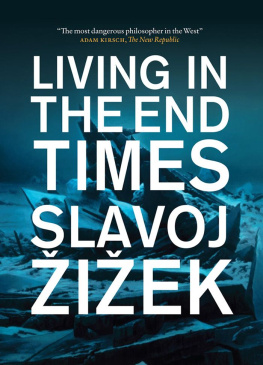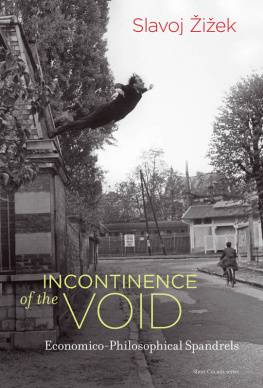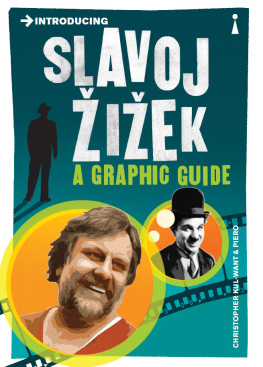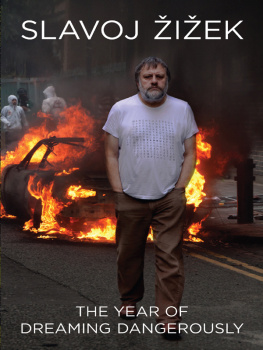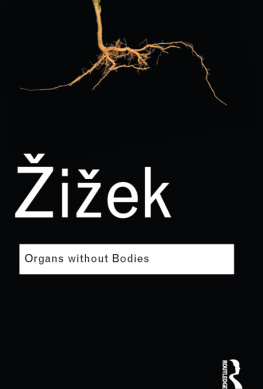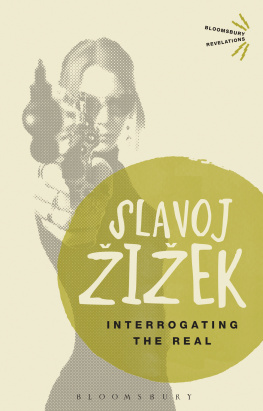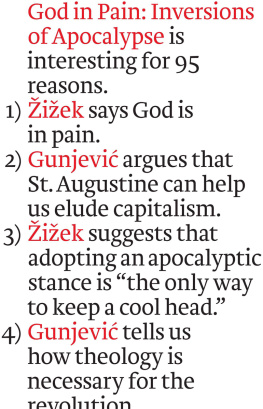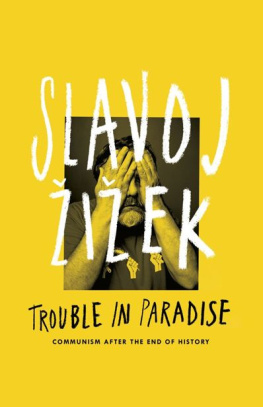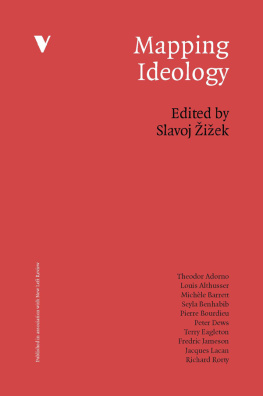Slavoj Žižek - The Ticklish Subject: The Absent Centre of Political Ontology
Here you can read online Slavoj Žižek - The Ticklish Subject: The Absent Centre of Political Ontology full text of the book (entire story) in english for free. Download pdf and epub, get meaning, cover and reviews about this ebook. publisher: Verso, genre: Religion. Description of the work, (preface) as well as reviews are available. Best literature library LitArk.com created for fans of good reading and offers a wide selection of genres:
Romance novel
Science fiction
Adventure
Detective
Science
History
Home and family
Prose
Art
Politics
Computer
Non-fiction
Religion
Business
Children
Humor
Choose a favorite category and find really read worthwhile books. Enjoy immersion in the world of imagination, feel the emotions of the characters or learn something new for yourself, make an fascinating discovery.
- Book:The Ticklish Subject: The Absent Centre of Political Ontology
- Author:
- Publisher:Verso
- Genre:
- Rating:5 / 5
- Favourites:Add to favourites
- Your mark:
- 100
- 1
- 2
- 3
- 4
- 5
The Ticklish Subject: The Absent Centre of Political Ontology: summary, description and annotation
We offer to read an annotation, description, summary or preface (depends on what the author of the book "The Ticklish Subject: The Absent Centre of Political Ontology" wrote himself). If you haven't found the necessary information about the book — write in the comments, we will try to find it.
The Ticklish Subject: The Absent Centre of Political Ontology — read online for free the complete book (whole text) full work
Below is the text of the book, divided by pages. System saving the place of the last page read, allows you to conveniently read the book "The Ticklish Subject: The Absent Centre of Political Ontology" online for free, without having to search again every time where you left off. Put a bookmark, and you can go to the page where you finished reading at any time.
Font size:
Interval:
Bookmark:

Slavoj iek was born in Ljubljana, Slovenia, in 1949, and is a professor at the European Graduate School, International Director of the Birkbeck Institute for the Humanities, Birkbeck College, University of London, and a senior researcher at the Institute of Sociology, University of Ljubljana. He has been a visiting professor at Columbia University, New York, and the University of Paris VIII, as well as at a number of other prestigious institutions on both sides of the Atlantic.
In his home country, he was a prominent political figure in the 1980s. He wrote a regular column for the newspaper Mladina and, in 1990, finished fifth in the election for Slovenias four-person presidency. His international reputation as a writer and philosopher was secured in 1989 with the publication of The Sublime Object of Ideology, a book which applied the authors pioneering distillation of Lacan, Hegel and Marx to an analysis of agency and modern ideology. A string of much lauded works have followed, including For They Know Not What They Do (1991), The Ticklish Subject (1999), Welcome to the Desert of the Real (2002), The Parallax View (2006) and In Defense of Lost Causes (2008).
As well as providing original insights into psychoanalysis, philosophy and radical political theory, he has, through employing his extraordinary scholarship to the examination of popular entertainment, established himself as a witty and deeply moral cultural critic. He has been the subject of two feature-length documentaries, Slavoj iek: The Reality of the Virtual (2004) and iek! (2005). He also presented and wrote the three-part British TV documentary A Perverts Guide to Cinema (2006).
His compelling, charismatic presence and puckish sense of the absurd have prompted the press to dub him the Elvis of cultural theory and an intellectual rock star. However, these jocular monikers belie a seriousness of purpose that has been nothing short of startling in an era marked by despondency and disengagement on the Left. More than an academic or theorist, iek has the gravitas and drive of a breed once thought extinct: the revolutionary. He has made philosophy relevant again for a whole generation of politically committed readers.
A series of classic philosophical texts from Verso
The four pillars of Slavoj ieks work are (Lacanian) psychoanalysis, (Hegelian) philosophy, a (Marxist) theory of ideology, and (Christian) theology. The structure of this scholarly edifice is mapped out in the titles of The Essential iek, four central interventions into each of these fields. The focus of The Sublime Object of Ideology is the importance of Lacans work to philosophy and contemporary political struggle; The Ticklish Subject examines German Idealism and the unsurpassable horizon of our thinking; The Plague of Fantasies anatomizes the ideological mechanisms that shape our daily experience; and The Fragile Absolute explores the emancipatory core of Christianity.
Also available from Verso by the same author:
In Defense of Lost Causes
Welcome to the Desert of the Real
Iraq: The Borrowed Kettle
Revolution at the Gates, iek on Lenin: The 1917 Writings
Lacan: The Silent Partners
The Absent Centre of Political Ontology

SLAVOJ IEK

First edition published by Verso 1999
This edition published by Verso 2008
Slavoj iek 1999
All rights reserved
5 7 9 10 8
The moral rights of the author have been asserted
Verso
UK: 6 Meard Street, London W1F 0EG
US: 20 Jay Street, Suite 1010, Brooklyn, NY 11201
Verso is the imprint of New Left Books
ISBN-13: 978-1-84467-301-8
British Library Cataloguing in Publication Data
A catalogue record for this book is available from the British Library
Library of Congress Cataloging-in-Publication Data
A catalog record for this book is available from the Library of Congress
Typeset by Hewer UK Ltd, Edinburgh
Printed in the US by Maple Vail
Why Lacan Is Not a Heideggerian
The Ticklish Subject focuses on the reassertion of Cartesian subjectivity. One of the main philosophical proponents of the critique of subjectivity is Martin Heidegger, who was a key reference point for Lacan, at least in the 1950s. For this reason, it is crucial to clarify Lacans reference to Heidegger, in particular, how he gradually moves from accepting Heideggers critique of the Cartesian cogito as another version of the Freudian decentring of the subject to the paradoxical and counter-intuitive embrace of the cogito as the subject of the unconscious.
Lacans starting point is Freuds notion of a primordial Bejahung, affirmation, as opposed to Verwerfung (usually [mis]translated as foreclosure). Lacan reads Bejahung as primordial symbolization, against the background of Heideggers notion of the essence of language as the disclosure of being. When we confront a fact that clearly runs against a deep conviction of ours, we can react to it in two basic ways: either simply brutally rejecting it, or endorsing it in a subl(im)ated form, as something not to be taken literally, but as an expression of a deeper/higher truth. We can, for example, either reject outright the idea that there is a Hell (a real place where sinners suffer endless pain as punishment for their bad deeds), or we can claim that Hell is a metaphor for the inner turmoil we suffer when we do something wrong. Recall the well-known Italian expression se non vero, ben trovato even if it is not true, its a good story or, to put it another way, if its not true, it should be. In this sense, anecdotes about famous people, even when apocryphal, often characterize the core of their personality more appropriately than would the enumeration of their real qualities here also, truth has the structure of a fiction, as Lacan put it. There is a wonderfully obscene Serbo-Croat version of this expression which perfectly renders the proto-psychotic rejection of the symbolic fiction: se non vero, jebem ti mater! Jebem ti mater (pronounced yebem ti mater, meaning Ill fuck your mother) is among the most popular of vulgar insults; the joke, of course, relies on the perfect match in scansion each phrase having the same number of syllables, with the stresses in the same positions between ben trovato and jebem ti mater. The meaning thus becomes an explosion of rage with an incestuous twist, attacking the others most intimate primordial object: It better be true because if it is not, Ill fuck your mother! These two versions thus clearly enact the two reactions to what literally turns out to be a lie: furious rejection, or its subl(im)ation into a higher truth. In psychoanalytic terms, their difference is that between foreclosure [Verwerfung] and symbolic transubstantiation.
However, things quickly get complicated here. Apropos the ambiguous relation in Freud and Lacan between Ausstossung (the expulsion of the Real which is constitutive of the emergence of the symbolic order) and Verwerfung
Font size:
Interval:
Bookmark:
Similar books «The Ticklish Subject: The Absent Centre of Political Ontology»
Look at similar books to The Ticklish Subject: The Absent Centre of Political Ontology. We have selected literature similar in name and meaning in the hope of providing readers with more options to find new, interesting, not yet read works.
Discussion, reviews of the book The Ticklish Subject: The Absent Centre of Political Ontology and just readers' own opinions. Leave your comments, write what you think about the work, its meaning or the main characters. Specify what exactly you liked and what you didn't like, and why you think so.

